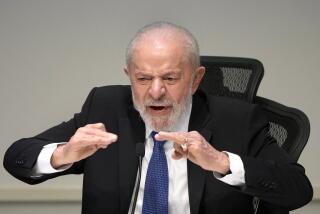Marxist Candidate Gains in Brazil Poll : South America: Survey indicates he could overtake centrist in presidential election.
- Share via
RIO DE JANEIRO — A party with Marxist roots and Communist allies has risen to within reach of power near the end of Brazil’s presidential election campaign, according to results of a voter-preference poll published Wednesday.
Luis Inacio Lula da Silva, head of the Marxist-oriented Workers’ Party, faces Fernando Collor de Mello, who calls himself a centrist reformer, in Sunday’s runoff vote. Collor’s advantage in polls taken by Ibope, Brazil’s leading surveyor of public opinion, has fallen in three weeks from 15 percentage points to 4.
Ricardo Noblat, a political columnist, said Lula’s momentum will be difficult to break. “If nothing new happens, Lula will overtake Collor by Sunday,” Noblat predicted.
Carlos Castello Branco, another columnist, said, “In the consensus of political observers, the presidential election is being decided in these last days, and its outcome is still unpredictable.”
Wednesday’s Ibope poll showed Collor leading Lula 47% to 43%. An Ibope poll published in late November showed Collor ahead 52% to 37%.
Ibope said 5% of the more than 3,000 voters interviewed in this week’s poll were still undecided and that another 5% indicated they would cast blank or voided ballots.
Brazilian voters have not elected a president since 1960. A 21-year period of military rule ended in 1985 with the inauguration of transitional President Jose Sarney.
Sarney has boasted that Brazil, with 145 million people, is taking its place as the world’s third-largest democracy, after India and the United States. If Lula wins, Brazil also could become Latin America’s third most leftist country, next to Nicaragua and Cuba.
Some Brazilian and foreign commentators have likened Lula to Salvador Allende, the Marxist who was elected to the presidency of Chile in 1970. After three years of political and economic turmoil, Allende died in a bloody military coup led by Gen. Augusto Pinochet.
With inflation of more than 40% a month, Brazil already is on the edge of economic turmoil, according to political scientist Helio Jaguaribe. He said the inability of a leftist government under Lula to control inflation and still meet its commitments to social change would soon lead to chaos and a coup.
Eduardo Suplicy, a Workers’ Party representative on the Sao Paulo City Council, also likened Lula to Allende.
“The election of Lula will mean the opportunity for a peaceful revolution,” Suplicy wrote in an article published Wednesday. “We are close to Allende’s Utopia, made viable by virtue of our having learned from the bitter Pinochetean tragedies.”
Lula, 44, is a former lathe operator and labor leader who helped found the Workers’ Party in 1980 and was elected to Congress in 1986. Black-bearded and heavy-set, he speaks with gruff eloquence about the party’s promise to bring workers to power.
In a 1981 policy speech, he said: “We don’t merely want to improve the conditions of the worker exploited by capitalism. We want to change the relationship between capital and labor. We want the workers to be owners of the means of production and the sources of their employment.”
While Lula calls himself a socialist rather than a Marxist, his party’s policy has been deeply influenced by Marxist and Leninist factions and is allied in a coalition with the Communist Party of Brazil, a splinter from the Brazilian Communist Party. The Brazilian Communist Party is also backing Lula, along with two moderate social democratic parties.
Collor, 40, is a populist firebrand who once belonged to the right-wing party that supported the military regime. Collor has campaigned on a centrist program of social and economic reforms that he says will favor Brazil’s poor.
More to Read
Sign up for Essential California
The most important California stories and recommendations in your inbox every morning.
You may occasionally receive promotional content from the Los Angeles Times.













